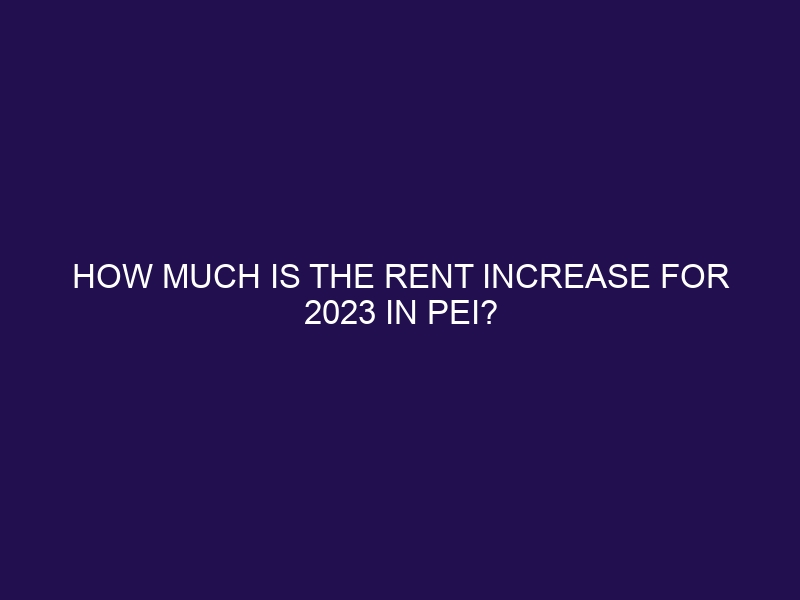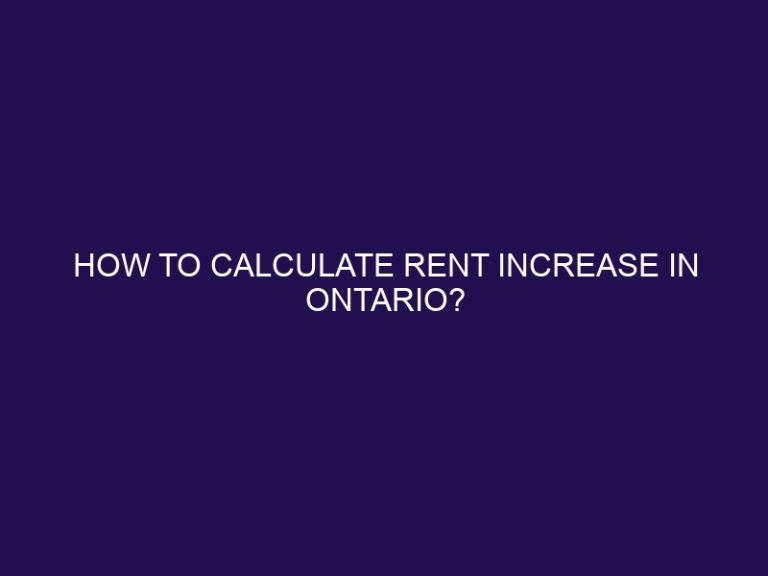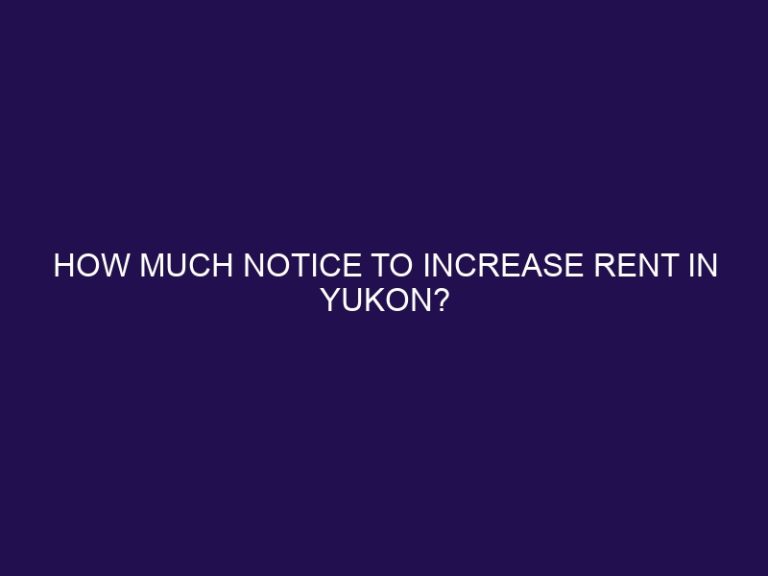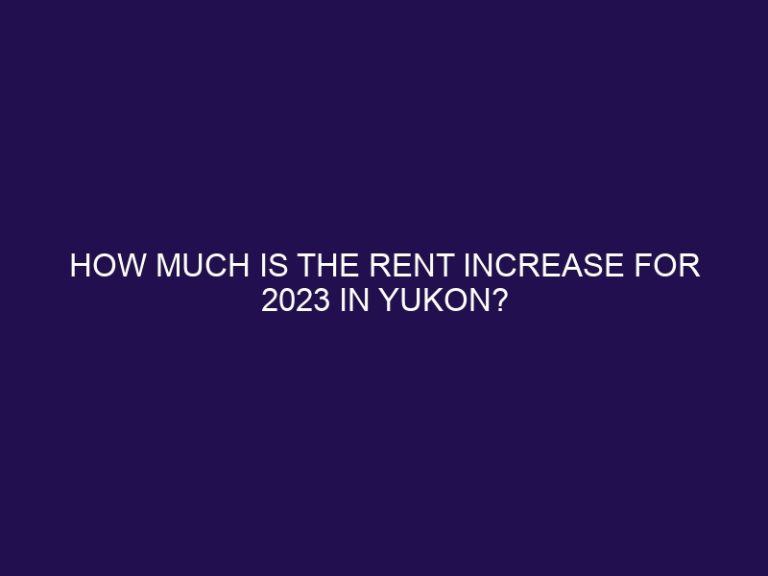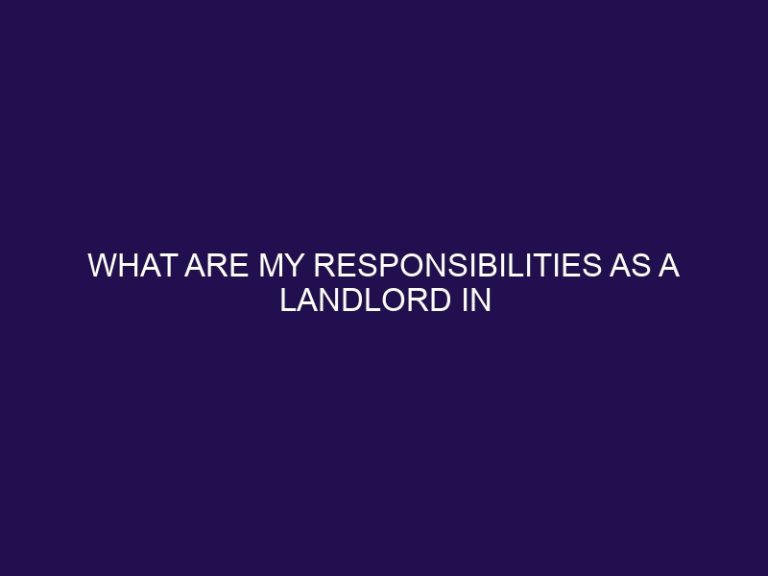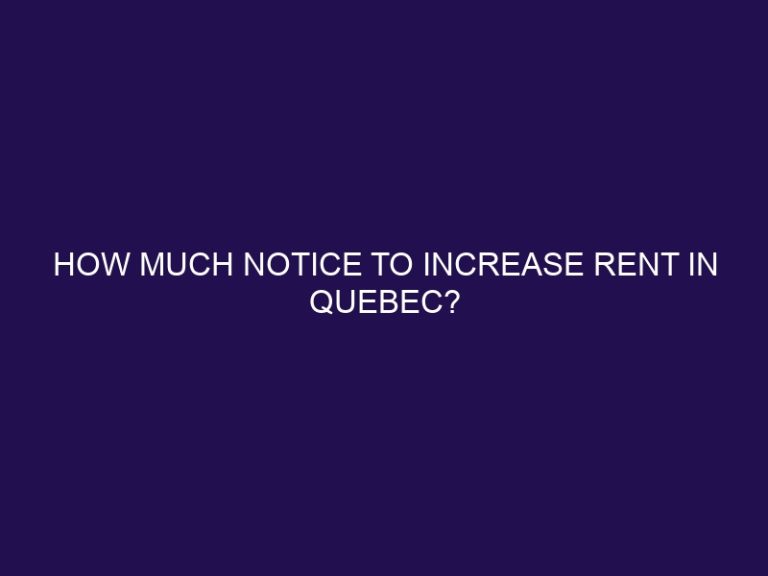How much is the rent increase for 2023 in PEI?
.jpg)
Rent increase regulations in Prince Edward Island (PEI) play a significant role in ensuring fairness and stability in the rental market. These regulations aim to protect tenants from unreasonable rent hikes while allowing landlords to maintain their properties and cover necessary expenses. Understanding the guidelines and factors that determine rent increases is essential for both tenants and landlords in PEI.
The overview of rent increase guidelines provides an introduction to the regulations in place, outlining the rights and responsibilities of both tenants and landlords. It lays the foundation for understanding the purpose and importance of rent increase regulations in maintaining affordable housing options and preventing rent gouging.
The legal framework for rent increase in PEI establishes the legal boundaries within which landlords can adjust rent prices. It covers the specific legislation and acts that govern rent increase processes, ensuring that both tenants and landlords abide by the law.
Factors that determine rent increase in PEI consist of various elements, such as the inflation rate, market conditions, operating costs, and property upgrades. These factors play a crucial role in determining the percentage by which rent can be increased while considering the financial viability of both landlords and tenants.
To provide clarity and transparency, specific rent increase percentages for 2023 in PEI are outlined for different types of rental properties, including residential rental units, mobile homes, and other rental properties. These percentages serve as a baseline for landlords to calculate rent adjustments based on the specific type of property.
Understanding how to calculate rent increase for 2023 is essential for both landlords and tenants. A step-by-step calculation method is provided, along with examples for different scenarios, to assist in determining the rent increase amount in compliance with PEI’s regulations.
Lastly, it is crucial to analyze the impacts of rent increase on various aspects, such as affordability challenges faced by tenants, the dynamics of the housing market, and the relationships between tenants and landlords. By examining these impacts, it becomes possible to assess the broader implications of rent increases in PEI.
By delving into the rent increase regulations, factors influencing rent adjustments, and the specific percentages for 2023 in PEI, this article aims to provide a comprehensive understanding of the rent increase landscape and its implications in the province.
Key takeaways:
- Rent increase regulations in PEI: There are guidelines and a legal framework in place to regulate rent increases in PEI.
- Factors determining rent increase: Rent increase is determined by factors such as inflation rate, market conditions, operating costs, and property upgrades.
- Rent increase percentages for 2023: The percentage of rent increase for residential rental units, mobile homes, and other rental properties in PEI for 2023 are outlined.
Rent Increase Regulations in PEI
Get ready to dive into the world of rent increase regulations in PEI. We’ll explore the overview of rent increase guidelines, the purpose and importance of these regulations, and the legal framework surrounding rent increase in PEI. Discover how these regulations impact tenants and landlords alike, and gain a better understanding of the factors at play when it comes to determining rent hikes. So, let’s uncover the ins and outs of rent increase regulations in PEI and what they mean for residents.
Overview of Rent Increase Guidelines
The text provides an overview of rent increase guidelines in PEI. These guidelines play a crucial role in maintaining fairness and protection for both tenants and landlords. The legal framework in PEI outlines various factors that determine rent increases, including the inflation rate, market conditions, operating costs, and property upgrades. For the year 2023, specific rent increase percentages have been established for different types of rental properties, such as residential units and mobile homes. It is essential for landlords and tenants to understand how to calculate rent increases as they can greatly impact affordability, housing market dynamics, and tenant-landlord relationships. Being aware of these guidelines is key to navigating the rental market in PEI successfully. Did you know that PEI’s rent increase guidelines aim to strike a balance between maintaining affordable housing options and ensuring landlords can cover their operating costs?
Purpose and Importance of Rent Increase Regulations
The purpose and importance of rent increase regulations are crucial to ensure fairness and protect tenants from excessive rent hikes. These regulations aim to balance the needs of both landlords and tenants, providing stability in rental markets. Rent increase guidelines play a vital role in maintaining affordability and preventing landlords from exploiting their power. In PEI, rent increase regulations are essential to prevent homelessness, maintain social cohesion, and promote sustainable housing. By setting limits on rent increases, these regulations actively contribute to creating a more equitable rental market and safeguarding the rights of tenants. It is of utmost importance for the government to enforce and regularly review these regulations to effectively address housing affordability challenges and maintain a healthy tenant-landlord relationship.
Legal Framework for Rent Increase in PEI
The Legal Framework for Rent Increase in PEI is a vital component that affects both landlords and tenants. It establishes the structure and guidelines for determining the permissible increment of rent and the conditions surrounding it. These regulations aim to ensure fairness and safeguard tenants against unreasonable increases. Within PEI, the legal framework for rent increase takes into consideration various factors such as the inflation rate, market conditions, operational expenses, and property improvements. By comprehending and adhering to these regulations, landlords can maintain a stable rental market, while tenants can be assured that their rent hikes are within reasonable limits. It is crucial for both parties to be well-informed about their rights and responsibilities to cultivate a positive tenant-landlord relationship.
Factors that Determine Rent Increase
The rent increase for 2023 in PEI is influenced by several key factors. In this section, we’ll explore these factors that play a role in determining how much the rent will be raised. From the inflation rate to market conditions, operating costs, and property upgrades, each sub-section uncovers a different aspect that impacts rent prices. Get ready to delve into the reasons behind the changing rental landscape in PEI and how these factors shape the rent increase for the upcoming year.
Inflation Rate
The inflation rate is a key factor in determining rent increases in PEI for 2023. The inflation rate represents the average increase in prices for goods and services in the economy. Landlords in PEI often use the inflation rate as a benchmark for raising rents. The government of PEI sets guidelines for rent increases based on the inflation rate to ensure fairness and affordability for tenants. For 2023, the inflation rate is expected to be around 2.5%. This means that landlords can typically increase rents by a maximum of 2.5% for residential rental units, mobile homes, and other rental properties. It is important for both landlords and tenants to be aware of the inflation rate and its impact on rent prices. By understanding the inflation rate, tenants can better plan and budget for potential rent increases, while landlords can make informed decisions about adjusting rental rates.
Market Conditions
Market conditions play a vital role in determining rent increases in PEI. These conditions, which encompass factors such as supply and demand, vacancy rates, and overall economic trends, hold significant importance. Landlords may adjust rent based on these market conditions to optimize profitability or offset rising costs. In instances where the rental market is highly competitive, characterized by high demand and limited supply, landlords may seize the opportunity to increase rent. Conversely, in a less favorable market with elevated vacancy rates, landlords might not have the ability to significantly raise rent. It remains crucial for both tenants and landlords to stay well-informed about market conditions in order to make informed decisions regarding rent adjustments.
Operating Costs
Operating costs play a crucial role in determining rent increases in PEI. Landlords must consider expenses such as maintenance, repairs, insurance, property taxes, and utilities. These costs can fluctuate based on market conditions and the condition of the rental property. Landlords may need to increase rent to cover these expenses and ensure the property remains profitable. It is important for landlords to strike a balance between covering their costs and maintaining affordability for tenants. By carefully calculating operating costs, landlords can make informed decisions about rent increases that are fair and reasonable.
Below is a table illustrating the different operating costs that landlords need to consider:
| Operating Costs | Examples |
|---|---|
| Maintenance | Repairs, landscaping |
| Insurance | Property insurance, liability insurance |
| Property Taxes | Payments to the municipal government |
| Utilities | Water, electricity, gas |
| Repairs | Fixing appliances, structural repairs |
Note: The information provided in the table is for illustrative purposes only and may not reflect the actual figures for operating costs in PEI.
Property Upgrades and Improvements
Property upgrades and improvements are important factors that can affect the amount of rent increase in PEI. Landlords have the right to raise rents if they have made substantial upgrades or improvements to the property. Here are some key points to consider regarding property upgrades and improvements when it comes to rent increase:
- Value-added enhancements: Landlords can justify rent increases if they have made improvements that enhance the value and quality of the rental property, such as renovating the kitchen or bathroom, installing new flooring, or adding modern amenities.
- Increased maintenance costs: If property upgrades and improvements result in higher ongoing maintenance costs for landlords, they may need to raise rents to cover those expenses.
- Fair market rent: Property upgrades can enable landlords to charge higher rents that align with the overall market rates for similar properties in the area.
- Communication with tenants: Landlords should effectively communicate with tenants about the planned upgrades, their impact on rental prices, and any adjustments in the lease agreement.
- Balance between cost and benefit: Both landlords and tenants should find a balance where property upgrades and improvements contribute to a better living environment while still maintaining a fair and reasonable rent for the tenants.
By considering the impact of property upgrades and improvements, landlords can ensure that rent increases are justified and tenants can have a clear understanding of the value they are receiving for their rent.
Rent Increase Percentages for 2023 in PEI
Get ready to dig into the latest updates on rent increase percentages for 2023 in PEI! In this section, we’ll break it down for you, covering all the essential sub-sections – residential rental units, mobile homes, and other rental properties. Prepare to discover the facts, figures, and statistics that will shed light on the upcoming rent changes in PEI. From the latest trends to potential implications, we’ve got you covered for all the crucial details you need to know.
Residential Rental Units
- Rent increase regulations for residential rental units in PEI are crucial in ensuring fair and reasonable adjustments to rental rates. These regulations are based on various factors that help determine the permissible rent increase percentages for 2023. Here are some key points to consider regarding residential rental units:
- Rent Increase Guidelines: PEI has specific rules and guidelines in place to regulate how much landlords can increase rent for residential units.
- Inflation Rate: The inflation rate is an important factor in determining rent increase percentages. PEI considers the Consumer Price Index (CPI) as a measure of inflation.
- Market Conditions: The state of the rental market and supply and demand dynamics play a role in determining rent increase percentages.
It is essential for both tenants and landlords to be aware of these regulations and factors to maintain a balanced and stable rental market in PEI. To ensure a smooth process and avoid any disputes, it is recommended to seek legal advice or consult the Residential Tenancies Office for specific details regarding rent increase calculations and regulations for residential rental units.
Mobile Homes
Mobile homes are a distinctive aspect of the rental market in PEI, and they are also subject to rent increase regulations. Here are some key points to consider about rent increases for mobile homes in PEI:
-
Mobile homes, like other types of rental properties in PEI, are governed by the same rent increase regulations.
-
Several factors, including the inflation rate, market conditions, operating costs, and property upgrades, can influence the allowable rent increase for mobile homes.
-
The specific percentage for the rent increase in 2023 for mobile homes in PEI may vary depending on a variety of factors.
-
The calculation of rent increase for mobile homes follows the same step-by-step process as other residential rental units.
-
An increase in rent for mobile homes can affect the affordability of housing for tenants and contribute to the dynamics of the housing market in PEI.
-
When faced with rent increases, tenants may encounter difficulties in finding affordable housing options, which can impact tenant-landlord relationships.
Other Rental Properties
When it comes to other rental properties, there are several factors to consider for rent increase:
- Location: Rental rates can vary based on the location of the property. Properties in high-demand areas may see higher rent increases compared to other rental properties.
- Property type: Different types of rental properties, such as commercial or industrial spaces, may have their own specific rental regulations and guidelines.
- Market trends: Understanding the market conditions and rental rates in the area can help determine a fair rent increase.
- Property condition: Upgrades or improvements made to the property can justify a rent increase, especially if they enhance the value or appeal of the property.
- Comparable rents: Researching the rental rates of similar properties in the area can provide a benchmark for determining an appropriate rent increase.
Considering these factors can help landlords and tenants navigate rent increases for other rental properties in a fair and informed manner.
It is important for landlords to communicate any potential rent increases to tenants well in advance, providing a clear rationale behind the increase. On the other hand, tenants should be proactive in seeking justification for any proposed rent increases and consult any applicable rental regulations or guidelines.
How to Calculate Rent Increase for 2023
When it comes to calculating rent increase for 2023 in PEI, it’s crucial to know the right method. In this section, we’ll uncover the step-by-step calculation method, along with examples for different scenarios. Whether you’re a tenant or a landlord, understanding how to determine the rent increase can greatly impact your financial planning. So, let’s dive in and demystify the process to ensure you’re equipped with the knowledge you need for the upcoming year.
Step-by-Step Calculation Method
By following a step-by-step calculation method, landlords in PEI can accurately calculate the rent increase for the upcoming year. Here is a list of the steps using
- html tags:
- Step 1: Determine the current rent amount.
- Step 2: Determine the percentage increase allowed based on the rental property type (residential units, mobile homes, or other rental properties).
- Step 3: Calculate the rent increase amount by multiplying the current rent by the percentage increase.
- Step 4: Add the rent increase amount to the current rent to obtain the new rent amount for 2023.
Examples for Different Scenarios
| Examples for Different Scenarios | ||||||||||||
| When it comes to rent increase calculations in PEI, different scenarios can lead to varied outcomes. Here are some examples to illustrate how rent increases are determined: | ||||||||||||
|
||||||||||||
| These examples showcase how factors such as inflation rate, market conditions, and operating costs can influence the rent increase percentage in different scenarios. |
Impacts of Rent Increase
As the rent increase for 2023 in PEI looms, let’s delve into the far-reaching impacts it brings. From affordability challenges to housing market dynamics, and tenant-landlord relationships, this section uncovers the ripple effects that will shape the island’s rental landscape. Get ready to explore the numbers, facts, and events that shed light on the current situation and its potential consequences. Stay informed and equipped with the knowledge to navigate the evolving realities of renting in PEI.
Affordability Challenges
Affordability Challenges are a major concern in PEI when it comes to rent increases. It’s important to consider the following points:
- Rapid rent increases can create financial strain for tenants, especially those with fixed or limited incomes
- Low-income households may face difficulties in finding affordable housing options if rental prices continue to rise
- Rent increases can worsen the issues of housing affordability in already tight rental markets
- Long-standing residents can be displaced as they are priced out of their current homes
- To address the challenges of affordability, efforts include implementing rent control measures and investing in affordable housing options
Housing Market Dynamics
The dynamics of the housing market are essential when it comes to determining the percentages of rent increase in PEI. The factors that influence the housing market, such as supply and demand, population growth, and economic conditions, have a significant impact on rent prices. When the demand for rental properties surpasses the available supply, landlords may choose to raise rents in order to maximize their profits. Conversely, in a market that is saturated with rental properties, landlords may need to keep their rent prices competitive in order to attract tenants. Being aware of these housing market dynamics can enable tenants to anticipate potential rent increases and make well-informed decisions about their housing options. To obtain accurate information, it is recommended to stay updated on market trends and seek advice from local real estate experts.
Tenant-Landlord Relationships
Maintaining positive tenant-landlord relationships is crucial for a harmonious living experience. Here are some tips to cultivate a good rapport:
1. Clear communication: Establish open lines of communication to address concerns promptly and avoid misunderstandings.
2. Respect boundaries: Respect tenants’ privacy and enforce property rules fairly and consistently.
3. Timely maintenance: Address maintenance requests promptly to demonstrate care for the property and the tenant’s well-being.
4. Fairness in rent increase: If a rent increase is necessary, provide advance notice and follow legal regulations to ensure transparency.
5. Pro-tip: Regularly check in with tenants to ensure their needs are being met, fostering a positive landlord image.
Some Facts About Rent Increases in PEI for 2023:
- ✅ The new Residential Tenancy Act in Prince Edward Island (P.E.I.) has officially capped rent hikes at a maximum of six percent per year. (Source: CBC News)
- ✅ In 2023, the maximum allowable increase for all rental units in PEI is zero percent between January 1 and December 31. (Source: CBC News)
- ✅ Landlords can still apply for an increase greater than three percent by following the standard procedure. (Source: CBC News)
- ✅ The Island Regulatory and Appeals Board can set the annual maximum rent increase at three percent, with landlords having the option to apply for an additional three percent increase. (Source: CBC News)
- ✅ Applications for rent increases made before a certain date will be assessed under the old rules, with no limits on increases. (Source: CBC News)
Frequently Asked Questions
What is the maximum allowable rent increase in PEI for 2023?
In PEI, the maximum allowable rent increase for all rental units between January 1 and December 31, 2023, is zero percent, as per separate legislation passed in November.
How often can landlords increase rent in PEI?
Landlords in PEI can only increase rent once per year.
When should landlords notify tenants about a rent increase?
Landlords in PEI must provide tenants with a written notice of their intention to increase rent at least three months in advance.
How can landlords apply for a rent increase beyond the allowable amount in PEI?
If landlords in PEI wish to increase rent beyond the allowable amount, they must apply to the Director of Residential Rental Property using Form 12 and serve the tenant with a notice of their intention to apply for a rent increase beyond the allowable amount.
How does the Island Regulatory and Appeals Board assess rent increase applications in PEI?
The Island Regulatory and Appeals Board in PEI assesses rent increase applications based on factors such as vacancy rates, economic outlook, and input from landlords and tenants. The board can approve, partially approve, or deny the rent increase request.
What can tenants do if they believe a rent increase in PEI is excessive?
Tenants in PEI can challenge a rent increase that they believe is excessive by filing a tenant application to determine a dispute (Form 2(a)) with the Rental Office. This will initiate a hearing to resolve the matter between the tenant and landlord.

